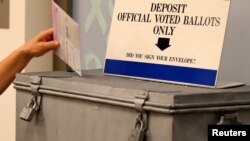The U.S. presidential race is sparking some keen interest among young Ugandan politicos. Fierce discussion on social media, packed debate venues and election night parties have highlighted a culture of young Ugandans who feel intricately connected to the US election.
Grace Abaho plans to spend the U.S. election night writing furiously until the polls close. A prominent blogger and founder of the Team Hillary Uganda coalition, he said American politics warrants global participation.
“So as a Ugandan and as a person who has so much interest in Hillary I was trying to sell my idea to the world, to Americans especially," he said. "Most of the funding here we get it from the United States. ... it makes many Ugandans like me interested in what happens in America."
Abaho said the Clinton vs. Trump debate in Uganda has ended friendships within his social circle and revealed a growing divide between liberal and conservative views in Uganda.
Ugandan public opinion was in part swayed by an unverified online report quoting Trump as saying he'd lock up longtime African dictators such as Zimbabwean President Robert Mugabe and Ugandan President Yoweri Museveni. The report, variations of which were carried on several news sites in the region for months, does not appear to have been true.
However Ugandan Trump supporter Benon Robe said it spread like wildfire among the country's opposition supporters.
“I know when he [Trump] comes to power he will help us here, like with the political situation in the country. He would literally help us," said Robe.
Recently two Ugandan Trump supporters were arrested outside the U.S. Embassy in Kampala protesting African dictatorships. Robe said these ideas have led to intense discussions among his social circle.
“The whole of last evening I was with friends discussing American politics," said Robe. "Basically we were counting down. Part of us were on the other side and a couple of us were on Trump’s side. So basically the whole night, it was the whole night up till 2a.m., we were discussing American politics and counting down.”
Martha Nakafero said Ugandan interest in American politics is just part of being informed.
“Let me use that quote that “when America sneezes the whole world gets a cold' — like it affects us," she said. "Yeah we don't actually vote, but we're affected. In fact, I think the outcomes of elections in America affect us more than the outcome of Kenya's election, who are just our neighbors.”
Yet supporters on both sides agree that just months after Uganda's own contentious presidential race, the U.S. election has helped recapture the energy of youth voters in Uganda.
Armed with smart phones and minute-by-minute updates, they can post opinions without self-censorship, engaging in a global political community where they feel their voice can be heard.




